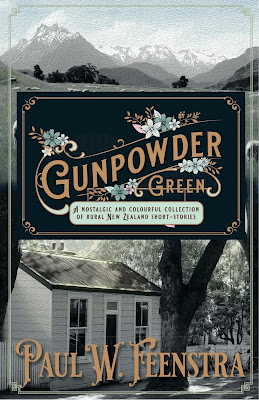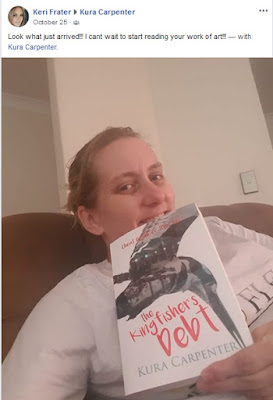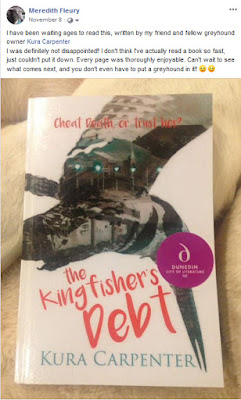Today I’m chatting with New Zealand historical writer Paul W. Feenstra. Paul wrote his first historical, For Want of a Shilling, in 2013 and as of 2021 has written 6 novels and 1 book of short-stories, Gunpowder Green, which I'll be discussing today.
Kura: Welcome, Paul, firstly I have to say I was really captivated by the title of this short story collection. Gunpowder Green has such an appealing ring to me. Obviously it hints at times gone-by, but also it created a question in my mind, ‘What can gunpowder green mean?’ I thought that a clever hook.
Anyway, let’s move on to the topic at hand. Historical fiction is a popular genre in NZ, but what about historicals drove or inspired you to write in that genre?
Paul: I love the challenge of research, and then developing a style that captivates the reader that is true to the time period. Some call this 'Faction', where fiction is woven through real historical events.
Kura: ‘Faction’, I like that term! I admit while I like the idea of writing historical, I’m a bit intimidated by having to “get things right”, if you know what I mean. That sounds like a lot of extra work on top the writing! What was your favourite and least favourite part in researching for the novel?
Paul: Not being able to easily find answers to questions. The internet provides so much, but not a lot about history as it relates to daily living. Most information on the internet is current, (relatively speaking) If I want to know how to treat a cold in 1840, I don't want the answer as it applies to the year 2021, I want to know what people did back then. That type of research is challenging.
Kura: That’s a good point. And, yeah, I suspected as much – it all means extra work! You mentioned developing a style that captivates. Can you elaborate? How would you describe your writing style within historical fiction?
Paul: My novels are written with commercial success in mind. That means, they move quickly, they are descriptive, and character driven.
Kura: I like the sound of that. Fast moving plots and character driven stories are just my cup of tea. And what are the stories collected within Gunpowder Green about?
Paul: In the tradition of iconic Kiwi short-stories, Gunpowder Green is a nostalgic look into New Zealand’s unique and colourful past. Light-hearted, humorous and even thought provoking, each story is varied and highlights New Zealand rural living, a diverse culture and a forgotten yet very familiar lifestyle. The stories are varied and best suited for a general audience.
Kura: That sounds really entertaining. Another one for my ever-increasing to be read pile, for sure.
Now, while I know you didn’t exactly set out to become a writer, however, what Top 3 Tips would you give to others starting the self-publishing journey that you wished you knew when you started?
Paul:
1. Learn about marketing
2. Shelve your ego and listen
3. Be objective.
Kura: That is some very solid advice, Paul. Thank you for sharing your insights, and Thanks to everyone for joining us by reading this interview.
And to let everyone know, you can find Gunpowder Green in all the usual places, ebook online at Amazon, and available throughout NZ in many independent book stores, including PaperPlus
But a wee tip from Paul is: if you want a print edition then he recommends purchase Gunpowder Green from MightyApe because it’s faster and cheaper.
About the author:
Paul W. Feenstra credits a freak tennis accident resulting in his Achilles tendon snapping with him discovering a passion for writing. During the 7 month recovery Paul found himself questioning, “Did I want to continue to commute to, and work in Hollywood? Or was I destined for better things, here in New Zealand?” Paul decided to write a book and walking around Wellington's bays, he encountered a peculiar and very old, pre-WWII structure. That discovery would ultimately lead to his first historical fiction novel, For Want of a Shilling. To learn more about Paul and his books, please visit Paul W. Feenstra’s website.
About the Interviewer:
Kura Carpenter is an award-winning writer based in Dunedin. She is currently working on a Cosy Mystery series with a paranormal twist. Kura is also a professional graphic designer and at her website The Book Carpenter provides NZ writers with Independent Publishing services and advice.














